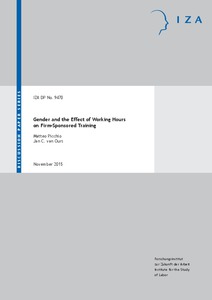Gender and the effect of working hours on firm-sponsored training
"Using employees' longitudinal data, we study the effect of working hours on the propensity of firms to sponsor training of their employees. We show that, whereas male part-time workers are less likely to receive training than male full-timers, part-time working women are as likely to rece...
| Main Authors: | , |
|---|---|
| Institution: | ETUI-European Trade Union Institute |
| Format: | TEXT |
| Language: | English |
| Published: |
Bonn
2015
IZA |
| Subjects: | |
| Online Access: | https://www.labourline.org/KENTIKA-19108490124919266729-Gender-and-the-effect-of-worki.htm |
| Summary: | "Using employees' longitudinal data, we study the effect of working hours on the propensity of firms to sponsor training of their employees. We show that, whereas male part-time workers are less likely to receive training than male full-timers, part-time working women are as likely to receive training as full-time working women. Although we cannot rule out gender-working time specific monopsony power, we speculate that the gender-specific effect of working hours on training has to do with gender-specific stereotyping. In the Netherlands, for women it is common to work part-time. More than half of the prime age female employees work part-time. Therefore, because of social norms, men working part-time could send a different signal to their employer than women working part-time. This might generate a different propensity of firms to sponsor training of male part-timers than female part-timers." |
|---|---|
| Physical Description: | 36 p. Digital |

